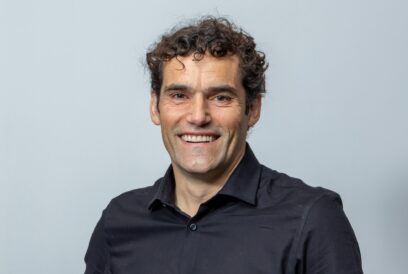

Marcella Milana devoted much of her research to lifelong learning and thinks that adult learners need competencies to grant them their citizenship rights.
Marcella Milana devoted much of her research to lifelong learning and thinks that adult learners need competencies to grant them their citizenship rights.
Are vocational skills still enough for adults in the challenging job market? Marcella Milana, professor in education and Chair of the European Society for Research on the Education of Adults, believes that unless we consider adults as citizens first, vocational skills won’t be enough.
The European Commission has made 2023 the European Year of Skills: an initiative to make sure adults have the relevant skills to successfully navigate the ever-changing labour market and fully engage in society.
“The problem is that the objectives identified by the European Year of Skills don’t really solve the issues we are facing in the world of adult education,” warns Marcella Milana, the newly elected Chair of the European Society for Research on the Education of Adults (ESREA), as of February 2023.
These skills have often been interpreted as practical competencies and know-how necessary to perform a specific occupation, and are therefore called vocational skills. Milana believes, however, that policies should focus on the reinterpretation of skills and competencies and the entire vision of adult learners.
“We should move away from the idea that they are merely people executing tasks. The individual is much more than that: adults are citizens,” she explains.
Listen to what research shows
The four objectives of the European Year of Skills are an increase in investment in training and skills development, improved cooperation between relevant stakeholders, better skills-and-job matching and the ability to attract talent.
Although Milana admits that all the goals are in principle good, “research cautions on a number of issues that should be considered by policy-makers, stakeholders and practitioners”.
“Our goal at ESREA is to support quality research: we can’t make direct changes to governmental decisions, but if we improve the quality of research then we can provide information that could stimulate change.”
The danger of the low-skill trap
For example, the first point of increasing investment in training and skills development is surely important, but research shows that Europe is undergoing a serious problem of unequal access to reskilling and upskilling opportunities.
“Low-skilled adults are disadvantaged when it comes to accessing available opportunities and the so-called ‘low-skill trap’ happens.”
This means that people who have lower levels of formal education generally experience less favourable working positions and limited career opportunities.
This is why broadening the interpretation of vocational skills is of the outmost importance for adults, more than for young learners.
“Young people have more opportunities to experience an all-round education, since in school they are exposed to different sets of knowledge. For adults – on the other hand – the courses are often focused on developing specific skills to perform a certain job.”
Adults are learners, but they are also parents and citizens.
Although Milana recognises the importance of developing these skills, she thinks they are not enough.
“Being an adult means that the individual is much more than a learner: adults are parents, social actors and citizens so their actions have a fundamental impact on our society.”
If vocational skills can help with finding a job, it is life skills that allow people to be fully integrated in their working team, but also to make conscious decisions.
“Awareness is a fundamental factor: workers should have the necessary tools to understand the bigger picture in which their activity is included.”
For example, a typical vocational skill that is required is the ability to use the internet and the new forms of communications.
“But if a person is not able to interpret and evaluate the messages they receive in the virtual world without developing media literacy, then they won’t be able to properly exercise their citizenship and work rights.”
Vocational skills are reductive
Milana praises the European Year of Skills for including improved cooperation between relevant stakeholders in their goals, as this is key to overcoming the fact that the responsibility for skills development and better career prospects is only placed on the individuals.
“But unless skills development is re-framed as a collective responsibility and endeavour, this aspiration cannot be realised.”
The idea is that skills should not be equated to goods, something that is just provided to a person, but rather the focus should be shifted to broader knowledge, abilities, values, critical thinking and even emotional knowledge. The real problem is when vocational skills are interpreted in a reductive way, and consideration is not given to the fact that allowing adults to cognitively develop is a fundamental matter for the society.
The importance of life skills
Similarly, when it comes to the third goal of better matching skills and jobs, “more inclusive and diverse strategies need to be designed by institutions, workplaces and education providers. But we also need to recognise the skills people already have.” Life skills are just as important as the traditionally interpreted vocational skills.
The last goal of the European Year of Skills is to attract talent from non-EU countries.
“However, there is a substantial pitfall in supporting a system for incoming migrants and in recognising competencies and skills they have acquired elsewhere. We need better support in mobility and integration if we want to open the European labour market to migrants and refugees.”
Our societies are becoming more diverse and multicultural, and this is another aspect where vocational skills prove insufficient in the forming of an active adult learner and citizen.
“In order to be able to productively act in an intercultural environment, workers need to learn how to interface with different cultures. Therefore, intercultural understanding becomes a fundamental competency that adults need to develop, but it is not a vocational skill.”
“The truth is we not only need skills, but capacities, knowledge and values. Reducing vocational skills to mere technical abilities is not enough for the all-round education of conscious adults and citizens,” concludes Milana.
Marcella Milana
- was elected Chair of the European Society for Research on the Education of Adults (ESREA) in February 2023
- is Associate Professor of Education at the University of Verona in Italy and Honorary Professor of Adult Education at the University of Nottingham, School of Education in the United Kingdom
Author







